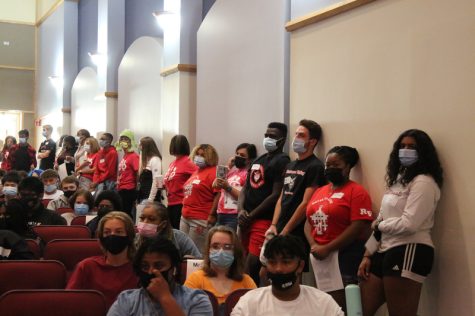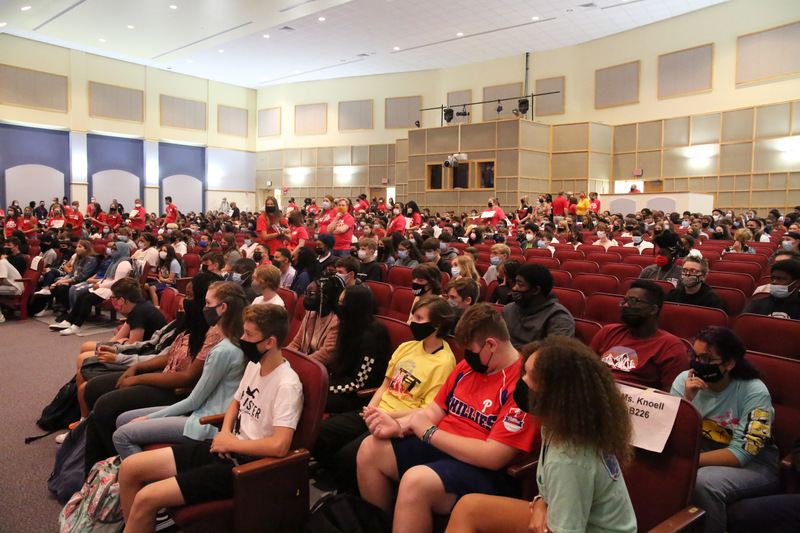The kids are not alright: are the freshmen out of control?
How the pandemic has impacted the behavior of the freshman class
Photo courtesy of Dr. Maniglia
Events like the freshman orientation program are supposed to help freshmen transition into RV, but many teachers note the need for further intervention
November 13, 2021
Lacking a normal year of school since the sixth grade, the freshman class at RV has become known for demonstrating an abundance of behavioral issues. From not knowing how to behave to being behind in reading and math to a surge in disciplinary action, the freshman class’s behavioral and academic issues are prevalent throughout the hallways and classrooms of RV.
The previous school years have arguably deprived the freshman class of a normal school environment that is so imperative to the development of their social, behavioral and educational skills, and COVID-19 and virtual learning has challenged the new students in many ways.
“Through the pandemic, students are challenged to balance school, home and social responsibilities,” Mrs. Longino, an Algebra I teacher at RV, said. “The lack of belonging and connecting to peers while learning remotely has greatly impacted many students negatively in class.”
From the start of the pandemic, virtual learning was an option for all students to protect them. This option, however, has been proven to simultaneously fail them in a number of other ways, namely through the failure to build social competence and academic structure that a typical RV classroom upholds. This was a catch-22 for many school districts, including RV, which made extended efforts to get kids in seats in school. At what point do you trade social, emotional, and academic proficiency for physical health?
With extended due dates, lack of interaction and deficiency of discipline and behavioral correction, the freshman have not experienced a normal high school environment, which explains why these behavioral issues are occurring.

“Discipline infractions are up based on students coming back from a year and a half of not being in a traditional [school] setting,” Mr. Bowker, the assistant principal of Climate and Culture at RV said. “A lot of students were virtual last year, we were hybrid last year as well. It’s just that a lot of freshman and sophomores haven’t been in the RV culture for an extended amount of time. Coming from small schools to big schools has always been a challenge for freshmen”.
Mr. Bowker is heavily involved in the “RV culture” he references. The root of these behavioral issues perhaps, is the lack of exposure to this RV culture, as new students did not have the opportunity to involve themselves as much due to the pandemic.
“I’ve taught freshmen every semester, and what I’m noticing with this freshmen class is the inability to sit and be,” Ms. Filauro, a freshmen English teacher at RV said. “There always needs to be some kind of simulation happening. Without simulations, there’s odd behaviors going on like fidgeting and ripping papers. They have forgotten what’s okay when regarding behavior in a classroom. The first five minutes of class is me correcting behavioral issues, taking time away from instructional learning.”
In the high school environment, these types of behaviors in the classroom are almost unheard of. Not only is this behavior affecting other students of RV, it affects the teacher’s ability to effectively teach the class, taking time away from the learning experience.
On the other hand, some teachers who work with freshmen have a different perspective to offer about the freshman class, supporting the notion that not every single student has behavioral issues.
“The experience that I’ve had this year has been quite the contrary,” Mrs. Shelley, a freshman Honors World History teacher, said. “My first block class is in many clubs and is highly involved. My students are really trying to take advantage of everything RV has to offer. I have some really strong freshman classes.” Mrs. Shelley’s positive experience with her freshman class supports the notion that not all freshmen have behavioral issues, therefore the class as whole cannot be categorized in this way.
Mrs. Wittmann, a freshman English teacher here at RV proposes a solution that goes beyond the discipline office. She suggests the upperclassmen’s involvement and guidance is key to aid the freshmen through these behavioral problems.
“I would call upon the upperclassmen to help with this in a lot of ways,” she said. “I think the freshmen really need to see the culture of RV, and see how it’s a place of learning and enthusiasm and school spirit, a positive things; not an atmosphere of always trying to get one over on the teachers and trying to get away with doing less.”
Bringing in the pivotal aspect of RV culture, Mrs. Wittmann instills hope for a solution for the freshmen class. Many students note that the culture at RV is a great experience that embodies school spirit, positivity, opportunity for academic achievement and much more. Upperclassmen have been submerged in this culture, so perhaps the solution regarding the freshman class lies in the hands of the upperclassmen at RV. Perhaps upperclassmen could take in frequent flyers in the discipline office, mentoring them, showing them the ropes and so on.
With all of the ongoing behavioral issues brought to RV by the freshman class, many freshman teachers note that it is clear that a solution needs to be arranged, perhaps, as Mrs. Wittmann notes, with the support of the upperclassmen.






